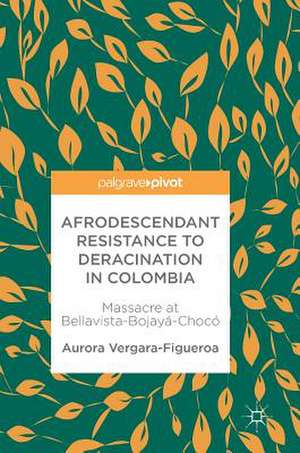Afrodescendant Resistance to Deracination in Colombia: Massacre at Bellavista-Bojayá-Chocó
Autor Aurora Vergara-Figueroaen Limba Engleză Hardback – 16 noi 2017
| Toate formatele și edițiile | Preț | Express |
|---|---|---|
| Paperback (1) | 411.93 lei 6-8 săpt. | |
| Springer International Publishing – 23 mai 2018 | 411.93 lei 6-8 săpt. | |
| Hardback (1) | 420.79 lei 6-8 săpt. | |
| Springer International Publishing – 16 noi 2017 | 420.79 lei 6-8 săpt. |
Preț: 420.79 lei
Nou
Puncte Express: 631
Preț estimativ în valută:
80.53€ • 83.97$ • 66.93£
80.53€ • 83.97$ • 66.93£
Carte tipărită la comandă
Livrare economică 21 martie-04 aprilie
Preluare comenzi: 021 569.72.76
Specificații
ISBN-13: 9783319597607
ISBN-10: 3319597604
Pagini: 123
Ilustrații: XXXII, 123 p. 5 illus.
Dimensiuni: 148 x 210 x 15 mm
Greutate: 0.4 kg
Ediția:1st ed. 2018
Editura: Springer International Publishing
Colecția Palgrave Macmillan
Locul publicării:Cham, Switzerland
ISBN-10: 3319597604
Pagini: 123
Ilustrații: XXXII, 123 p. 5 illus.
Dimensiuni: 148 x 210 x 15 mm
Greutate: 0.4 kg
Ediția:1st ed. 2018
Editura: Springer International Publishing
Colecția Palgrave Macmillan
Locul publicării:Cham, Switzerland
Cuprins
1: Beyond Sociology of Forced Migration.- 2: The Region: Emptied spaces and Geographies of death in Colombia.- 3: They Kill Us, Therefore We Exist?.- 4: Suffering while Black, Resistance amid Displacement.- 5: Final Remarks.
Notă biografică
Aurora Vergara-Figueroa is Assistant Professor and Director of the Afrodiasporic Studies Center (CEAF) at Icesi University, Colombia
Textul de pe ultima copertă
This book provides a socio-historical analysis of the 2002 massacre at Bellavista-Bojayá-Chocó, Colombia. The author examines how the concepts of forced displacement and migration could be formulas for historical erasure. These concepts are used to name populations, such as the survivors of this massacre, and are limited in their ability to contribute to the demands for reparation of the affected populations. Instead, based on an ethnographic study of the pain and suffering generated in the survivors, the book proposes the concept of deracination as a tool to study land dispossession. It captures both the complex local specificities, the global linkages of this phenomenon and the strategies of resistance used by the people of this community to channel what seems as an impossible mourning.
Caracteristici
Fills a gap in the literature addressing the 2002 massacre at Bellavista-Bojayá-Chocó Includes supplementary material: sn.pub/extras
